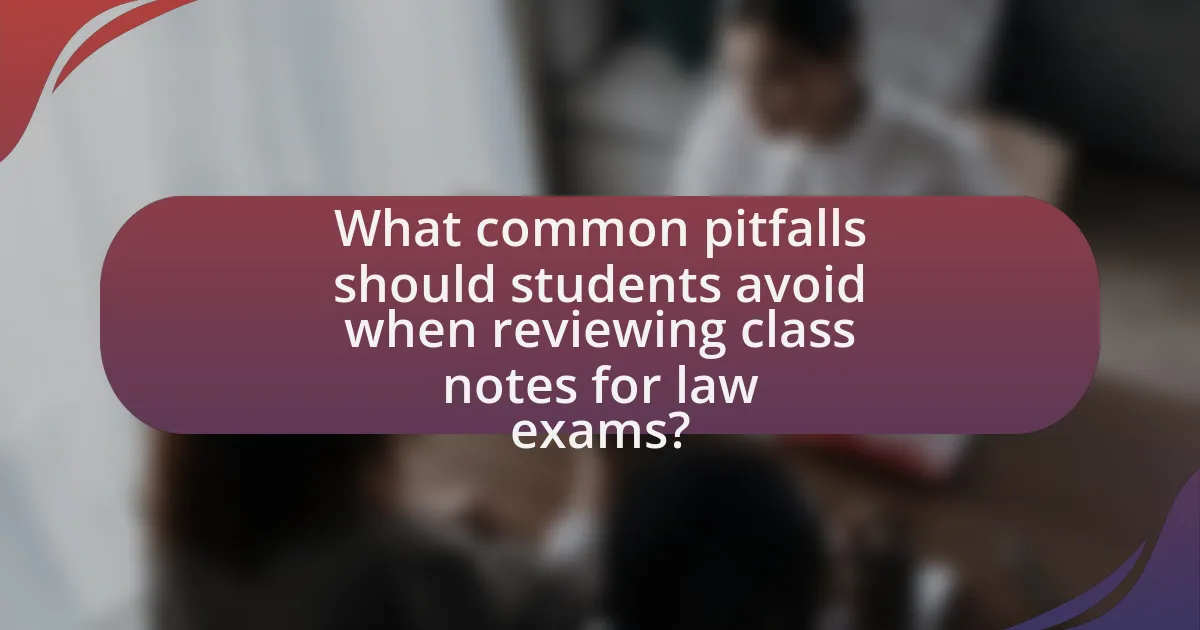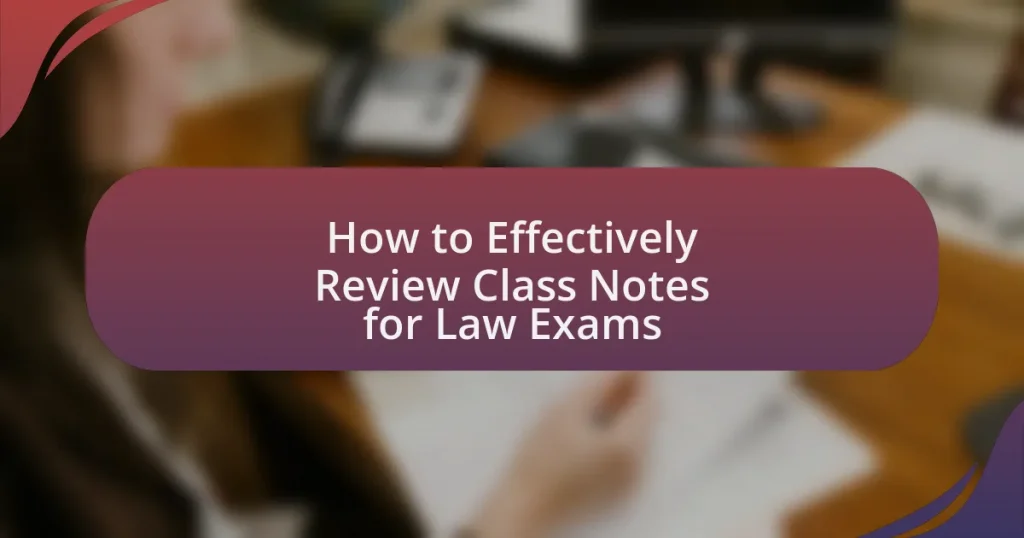The article focuses on effective strategies for reviewing class notes specifically for law exams. It outlines key techniques such as organizing notes, summarizing key concepts, utilizing active recall, and practicing past exam questions to enhance comprehension and retention of legal material. Additionally, it discusses the importance of effective note-taking, active engagement, and various study methods, including self-testing and group study sessions. The article also highlights common pitfalls to avoid, time management techniques, and practical tips to maintain focus and optimize study sessions, ultimately aiming to improve exam preparedness for law students.

What are the key strategies for reviewing class notes for law exams?
The key strategies for reviewing class notes for law exams include organizing notes, summarizing key concepts, utilizing active recall, and practicing past exam questions. Organizing notes involves categorizing information by topics or cases, which enhances retrieval during study sessions. Summarizing key concepts helps distill complex legal principles into manageable parts, making them easier to remember. Active recall, a technique supported by cognitive science, encourages students to test their knowledge by recalling information without looking at notes, reinforcing memory retention. Practicing past exam questions allows students to familiarize themselves with the exam format and identify areas needing further review. These strategies collectively improve comprehension and retention of legal material, essential for success in law exams.
How can effective note-taking enhance exam preparation?
Effective note-taking enhances exam preparation by improving information retention and comprehension. When students actively engage in the note-taking process, they synthesize and organize material, which leads to better understanding and recall during exams. Research indicates that students who take notes by hand perform better on tests than those who type, as handwritten notes encourage deeper processing of information (Mueller & Oppenheimer, 2014, Psychological Science). This method allows for the identification of key concepts and relationships, facilitating targeted review and efficient study sessions.
What techniques improve the clarity and organization of class notes?
Techniques that improve the clarity and organization of class notes include using structured formats like the Cornell method, employing bullet points for key information, and incorporating headings and subheadings for easy navigation. The Cornell method encourages dividing the page into sections for cues, notes, and summaries, which enhances retention and review efficiency. Bullet points help distill complex information into digestible pieces, making it easier to identify main ideas. Headings and subheadings create a clear hierarchy, allowing students to quickly locate specific topics within their notes. Research indicates that organized notes can lead to better academic performance, as students are more likely to engage with well-structured material.
How does summarizing notes aid in retention and understanding?
Summarizing notes significantly aids in retention and understanding by condensing information into key concepts, making it easier for the brain to process and recall. This technique encourages active engagement with the material, as students must analyze and synthesize information rather than passively reading. Research indicates that summarization enhances memory retention; for instance, a study published in the Journal of Educational Psychology found that students who summarized their notes performed better on recall tests compared to those who did not. This improvement is attributed to the cognitive effort involved in summarizing, which reinforces learning and comprehension.
What role does active engagement play in reviewing notes?
Active engagement significantly enhances the effectiveness of reviewing notes by promoting deeper understanding and retention of information. When students actively interact with their notes—through summarization, questioning, or teaching concepts to others—they reinforce their learning and improve recall. Research indicates that active learning strategies, such as self-explanation and retrieval practice, can lead to better academic performance, particularly in complex subjects like law, where comprehension of intricate legal principles is crucial. This engagement transforms passive reading into an active cognitive process, thereby solidifying knowledge and facilitating application during exams.
How can questioning techniques enhance comprehension of legal concepts?
Questioning techniques enhance comprehension of legal concepts by promoting critical thinking and active engagement with the material. When students employ questioning techniques, they are encouraged to analyze, synthesize, and evaluate legal principles rather than passively memorizing them. Research indicates that students who utilize questioning strategies, such as self-questioning or peer discussions, demonstrate improved understanding and retention of complex legal topics. For instance, a study published in the Journal of Legal Education found that law students who engaged in structured questioning during study sessions scored significantly higher on exams compared to those who did not. This evidence underscores the effectiveness of questioning techniques in deepening comprehension of legal concepts.
What methods can be used to test knowledge from class notes?
Methods to test knowledge from class notes include self-quizzing, summarization, and peer teaching. Self-quizzing involves creating flashcards or practice questions based on the notes, which enhances recall and understanding. Summarization requires condensing the material into key points, reinforcing comprehension and retention. Peer teaching allows students to explain concepts to each other, facilitating deeper learning through discussion and clarification. Research indicates that active engagement with material, such as through these methods, significantly improves retention and understanding, as supported by studies on retrieval practice and collaborative learning.

How can students create a structured review plan for law exams?
Students can create a structured review plan for law exams by organizing their study materials, setting a timeline, and utilizing active learning techniques. First, students should categorize their class notes by subject and topic, ensuring that they have a comprehensive overview of the material. Next, they should establish a study schedule that allocates specific time blocks for each subject, allowing for regular review sessions leading up to the exam date. Incorporating active learning methods, such as practice exams and group discussions, can enhance retention and understanding of complex legal concepts. Research indicates that spaced repetition and retrieval practice significantly improve memory retention, making these techniques effective for law exam preparation.
What components should be included in a law exam review schedule?
A law exam review schedule should include the following components: a timeline for reviewing each subject, a breakdown of key topics within each subject, practice exams, and scheduled breaks. The timeline ensures that all subjects are covered systematically, while the breakdown of key topics allows for focused study on essential areas of law. Incorporating practice exams helps to assess understanding and application of legal principles, and scheduled breaks prevent burnout, enhancing retention and focus. These components collectively create a structured approach to effective exam preparation.
How can students prioritize topics based on their class notes?
Students can prioritize topics based on their class notes by identifying key concepts, themes, and frequently covered material. This can be achieved by reviewing notes for highlighted sections, recurring terms, and topics emphasized by the instructor during lectures. Research indicates that focusing on high-frequency topics can enhance retention and understanding, as these areas are often critical for exams. For instance, a study published in the Journal of Educational Psychology found that students who concentrated on core themes performed better in assessments compared to those who studied less relevant material.
What time management techniques can optimize study sessions?
Effective time management techniques that can optimize study sessions include the Pomodoro Technique, time blocking, and the Eisenhower Matrix. The Pomodoro Technique involves studying for 25 minutes followed by a 5-minute break, which enhances focus and retention. Time blocking allocates specific time slots for different subjects or tasks, ensuring dedicated attention and reducing distractions. The Eisenhower Matrix helps prioritize tasks based on urgency and importance, allowing students to focus on high-priority study materials first. Research indicates that structured study sessions improve information retention and academic performance, making these techniques beneficial for law exam preparation.
How can students incorporate different study methods into their review plan?
Students can incorporate different study methods into their review plan by utilizing a combination of active recall, spaced repetition, and varied practice techniques. Active recall involves testing oneself on the material, which enhances memory retention; spaced repetition schedules reviews over increasing intervals, optimizing long-term retention; and varied practice encourages applying concepts in different contexts, reinforcing understanding. Research indicates that these methods significantly improve learning outcomes, as evidenced by studies showing that active recall can boost retention rates by up to 50% compared to passive review methods.
What are the benefits of group study sessions for law exam preparation?
Group study sessions for law exam preparation enhance understanding and retention of complex legal concepts. Engaging with peers allows students to clarify doubts, share diverse perspectives, and discuss case law, which deepens comprehension. Research indicates that collaborative learning can improve academic performance; for instance, a study published in the Journal of Educational Psychology found that students who participated in group study sessions scored higher on assessments compared to those who studied alone. Additionally, group sessions foster accountability, motivating members to stay on track with their study schedules.
How can visual aids enhance the review of complex legal topics?
Visual aids enhance the review of complex legal topics by simplifying intricate information and improving comprehension. They allow students to visualize relationships between concepts, making it easier to grasp and retain legal principles. For instance, flowcharts can illustrate procedural steps in legal processes, while diagrams can depict the structure of legal arguments. Research indicates that visual learning can increase retention rates by up to 65%, compared to 10% for verbal information alone. This demonstrates that incorporating visual aids into study practices can significantly bolster understanding and recall of complex legal material.

What common pitfalls should students avoid when reviewing class notes for law exams?
Students should avoid several common pitfalls when reviewing class notes for law exams, including neglecting to organize their notes, failing to integrate case law and statutes, and not actively engaging with the material. Disorganized notes can lead to confusion and hinder effective study, as students may struggle to locate key information. Additionally, simply reading notes without connecting them to relevant legal principles or real-world applications can result in superficial understanding. Engaging with the material through practice questions or discussions enhances retention and comprehension, making it crucial for students to adopt active study techniques.
How can procrastination impact exam preparation?
Procrastination negatively impacts exam preparation by reducing the time available for effective study and increasing stress levels. When students delay their study sessions, they often find themselves cramming information shortly before the exam, which can lead to poor retention and understanding of the material. Research indicates that cramming is less effective than spaced repetition, as it hampers long-term memory consolidation (Cepeda et al., 2006, Psychological Science). Additionally, procrastination can lead to heightened anxiety, which further impairs cognitive function and performance during exams.
What strategies can help students stay motivated during their review process?
To help students stay motivated during their review process, setting specific goals and creating a structured study schedule are effective strategies. Research indicates that goal-setting enhances motivation by providing clear targets, which can lead to increased focus and productivity. Additionally, breaking down the review material into manageable sections and incorporating regular breaks can prevent burnout and maintain engagement. A study published in the Journal of Educational Psychology found that students who utilized structured study schedules reported higher levels of motivation and better retention of information.
How can distractions be minimized during study sessions?
Distractions can be minimized during study sessions by creating a dedicated study environment that is free from interruptions. This involves selecting a quiet space, turning off notifications on electronic devices, and using tools like website blockers to limit access to distracting sites. Research indicates that a controlled environment enhances focus; for instance, a study published in the Journal of Educational Psychology found that students who studied in distraction-free settings performed better on tests compared to those in noisy or cluttered environments.
What are the best practices for ensuring effective note review?
The best practices for ensuring effective note review include organizing notes systematically, summarizing key concepts, and regularly revisiting the material. Organizing notes helps in quickly locating information, while summarizing reinforces understanding and retention of essential topics. Regularly revisiting notes, ideally spaced over time, enhances memory retention through spaced repetition, a technique supported by cognitive science research, which shows that reviewing material at intervals significantly improves long-term recall.
How can students assess their understanding of the material effectively?
Students can assess their understanding of the material effectively by utilizing self-testing methods, such as practice exams and flashcards. Research indicates that self-testing enhances retention and comprehension, as it actively engages students in recalling information, which reinforces learning. A study published in the journal “Psychological Science” by Roediger and Butler (2011) found that students who frequently tested themselves on the material performed significantly better on final exams compared to those who only studied passively. This demonstrates that self-assessment techniques are crucial for evaluating and solidifying understanding of complex subjects, such as law.
What tips can help students maintain focus and retention during review sessions?
To maintain focus and retention during review sessions, students should implement active learning techniques such as summarizing information, teaching concepts to peers, and utilizing spaced repetition. Active learning engages cognitive processes, enhancing retention; studies show that teaching others can improve understanding by up to 90%. Additionally, breaking study sessions into manageable chunks, typically 25-50 minutes followed by short breaks, helps sustain concentration and prevents burnout, as supported by the Pomodoro Technique. Creating a distraction-free environment, using tools like noise-canceling headphones, and setting specific goals for each session further optimize focus and retention.
What practical tips can enhance the effectiveness of reviewing class notes for law exams?
To enhance the effectiveness of reviewing class notes for law exams, students should actively engage with the material through techniques such as summarization, self-testing, and spaced repetition. Summarizing notes helps distill complex legal concepts into manageable information, making it easier to recall during exams. Self-testing, through practice questions or flashcards, reinforces knowledge and identifies areas needing further review. Spaced repetition, which involves revisiting material at increasing intervals, has been shown to improve long-term retention of information, as supported by research from Cepeda et al. (2006) in “Distributed Practice in Verbal Memory Tasks: A Review and Quantitative Synthesis.” These strategies collectively foster a deeper understanding of legal principles and enhance exam preparedness.



